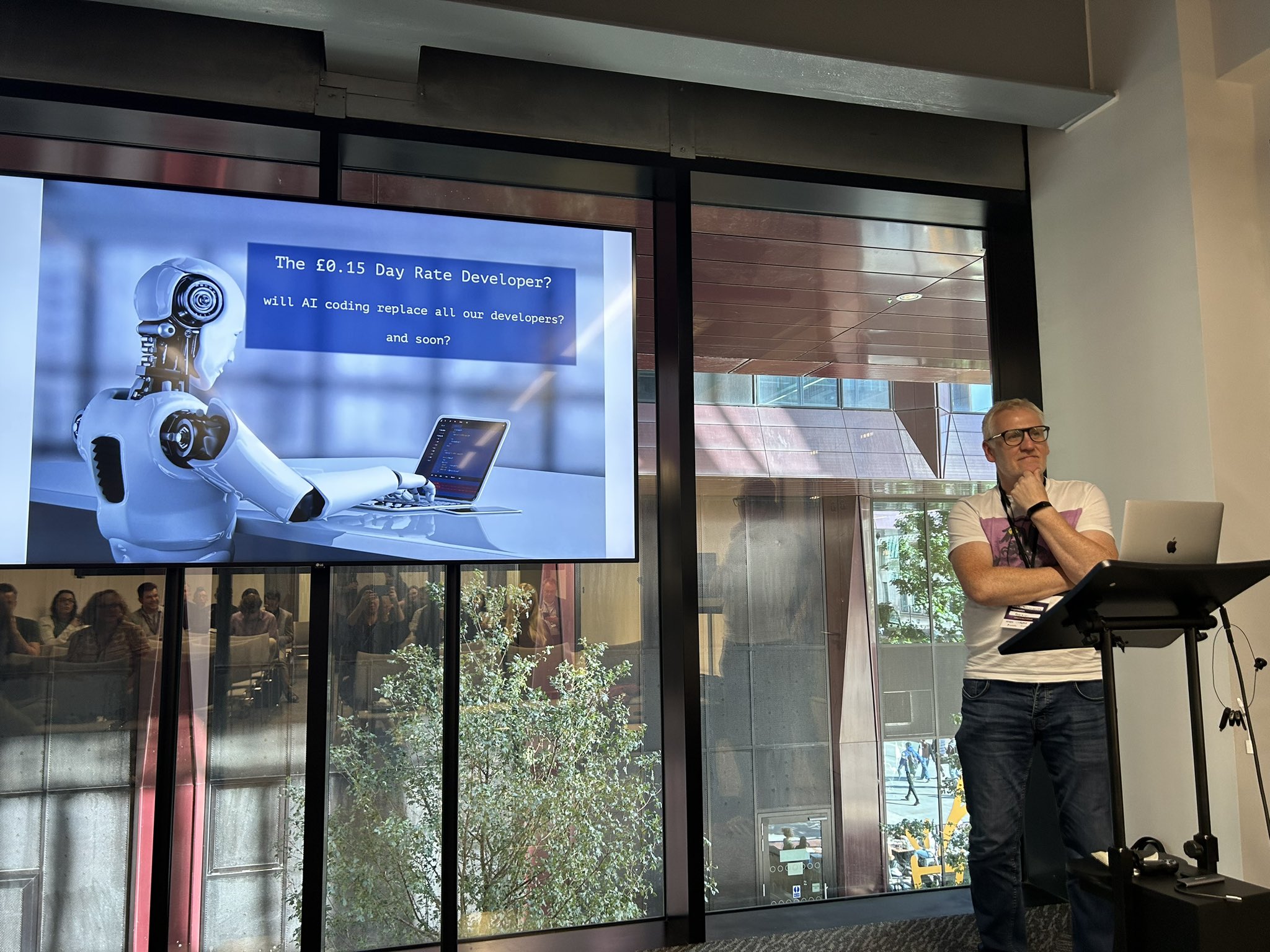In the fast-paced world of technology, change is the only constant. And when it comes to the fusion of artificial intelligence and coding, change is happening at an unprecedented pace. BankiFi COO, Kirk Winstanley, had the opportunity to deliver a presentation on this very topic during Fintech Week by Manchester Digital, exploring the profound impact of AI on the fintech industry and beyond.
Here's a breakdown of what Kirk presented at the event. Alternatively, click here to listen to the blog via the power of AI.
Why AI?
I was put forward for a speaking opportunity for Manchester Digital at their Fintech Week event but had one condition before accepting – I wanted to talk about something that was anything but boring. After some contemplation, I decided to dive into a topic that has been buzzing in the tech world:
"Is AI coding going to replace fintech developers?"
I knew this would pique the interest of not only tech enthusiasts but also members of the audience who were leaders and founders.
But I wasn't about to speak on something I wasn't well-versed in. So, I embarked on a research journey, conducted interviews, listened to podcasts, and created a narrative that delved into why I found this topic intriguing, where I stood in my understanding, and where I believed the future of AI was headed. My goal was to provide insights and provoke thoughts, rather than overwhelming the audience with facts.
I was aware that there would be questions, so I aimed to keep my presentation concise, lasting just 15 minutes. And I was right to do so because the audience came back with 15 minutes' worth of questions, consuming the entirety of my 30-minute slot. The engagement was fantastic!
One of the questions that stood out was, "What would you do if you were in my shoes?" I think this underscored the eagerness within the tech community to embrace AI in coding.
AI at a glance
One of the driving forces behind this AI revolution is the exponential increase in our general access to AI, particularly large language models like Chat GPT. These models have made it possible for us to communicate with AI effortlessly, eliminating the need for an in-depth understanding of the underlying AI models.
I also touched upon the role of Graphics Processing Units (GPUs) in AI. Unlike Central Processing Units (CPUs) that process complex commands, GPUs excel at handling a multitude of instructions simultaneously, albeit less complex ones.
The Impact of AI on Coding
I highlighted the advent of Co-pilot, an AI tool used with Github, which can write code 55% faster than developers. In fact, a staggering 48% of the code on Github has been written by AI in the last two years alone. This automation is not only accelerating coding but also reducing the number of Stack Overflow questions, as more developers turn to AI for assistance.
The Future of AI in Coding
I couldn't help but wonder where this AI-led transformation would lead us. I touched upon the possibility of two AI models that would emerge in the near future – one that would actually write code and another to review. While AI rarely makes mistakes, code reviews carried out by humans will be crucial.
In my opinion, we are rapidly moving towards a future where 99% of code will be written by AI within the next 2-3 years. The impact of AI in coding will be nothing short of revolutionary, akin to the transformation brought by computing in the 1970s, 80s, and 90s.
Adapting to the Changing Landscape
The challenge ahead is to convince our teams to embrace these AI tools. It's understandable that some might resist, fearing job displacement. However, the impact of AI extends beyond coding and will be on a scale similar to the advent of computers and smartphone. To stay ahead, we must continuously adopt and learn the latest AI capabilities, with the understanding that this landscape is set to evolve rapidly.
Already, AI is being integrated into everyday utilities like customer service, where it can provide answers based on vast knowledge bases. The potential applications of AI are vast and evolving, and we must be prepared to harness its capabilities to drive innovation and transformation in our industry.
To Conclude
AI revolution in coding is not just imminent; it's already here. Embracing AI as developers, coders etc. will not only streamline our work but also redefine our roles and responsibilities. As leaders within the technology industry, it's our responsibility to stay at the forefront of this transformation, constantly adapting to the changing landscape and leveraging AI to drive progress and innovation.
.png)

.png?width=600&name=Rectangle%20316%20(3).png)
.png?width=600&name=Webinar%20assets%20(1).png)

